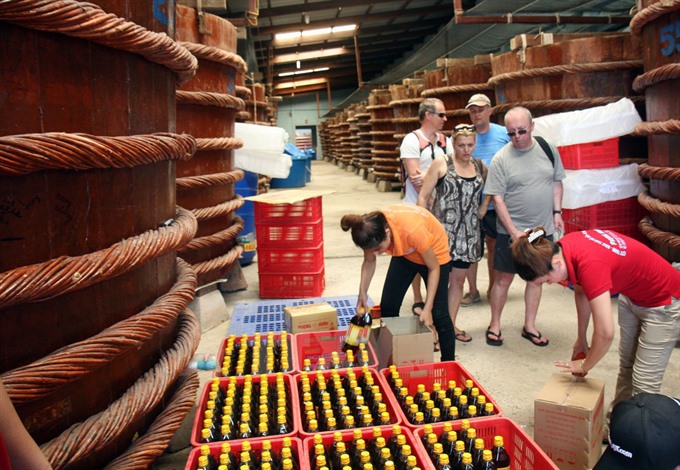 Economy
Economy

Prime Minister Nguyễn Xuân Phúc agreed in principle that the three special economic zones being planned by the Government to spearhead the country’s economic growth should enjoy special regulations and fewer limitations to woo investments.
 |
| Foreigners visit a fish source production facility in An Thới Town, Phú Quốc Insland. — VNA/VNS Photo Đình Huệ |
HÀ NỘI — Prime Minister Nguyễn Xuân Phúc agreed in principle that the three special economic zones being planned by the Government to spearhead the country’s economic growth should enjoy special regulations and fewer limitations to woo investments.
Phúc was speaking at a conference on Wednesday to discuss the draft Law on Special Economic Zones (or the Law on Special Administrative-Economic Units).
Conference participants agreed that the law needed to provide additional incentives than those stipulated by current legislation in order to create outstanding advantages for special economic zones.
For example, the Law on Land allows land lease of up to 70 years in economic zones, while many such zones in the world allow it for up to 99 years.
Phúc agreed, saying that the Law on Special Economic Zones should consider lifting land lease duration and allowing the use of assets associated with land use right as mortgages at foreign credit institutions to create favourable conditions for investors but still comply with the Constitution 2013 as well as international regulations.
In addition, the law must create a fair, transparent and stable investment environment and ease barriers to investments, Phúc said, adding that the compilation of the law must study the benefits and trade-offs in the short and long terms for the country and investors.
Phúc stressed that it was critical to identify the competitive advantages of each special economic zone to direct investments into sectors of priorities and promote sustainable growth.
Phúc asked the Ministry of Planning and Investment to complete the draft law and present it to the National Assembly for review in October.
The Vietnamese Government agreed to build three special economic zones to spearhead the country’s growth. One would be located in the coastal district of Vân Đồn in the northern province of Quảng Ninh, another in Bắc Vân Phong in the central province of Khánh Hoà, and the third on Phú Quốc Island in the southern province of Kiên Giang.
Currently, there is no special economic zone in Việt Nam, although the country had 18 coastal economic zones, 27 border economic zones and 325 industrial zones. Việt Nam established the Vũng Tàu–Côn Đảo Special Economic Zone in 1979, but it was dissolved in 1991.
The Ministry of Planning and Investment expects the three special economic zones to contribute billions of dollars to the gross regional domestic product (GRDP) each year from 2020 onwards.
In Vân Đồn, tax and fee collection is expected to total $4 billion, firms would generate added value of $9.7 billion during the 2021-30 period and contribution to the Quảng Ninh Province’s GRDP would grow from 5.2 per cent in 2020 to 7.7 per cent in 2030, while GDP per capita would grow to $12,500 by 2030 from an estimated $5,000 in 2020.
Tax and fee collection in Bắc Vân Phong is estimated to total $2.2 billion, added value generated by businesses $10 billion in the 2017-30 period, and contribution to the Khánh Hòa Province’s GRDP growth 6 per cent and GDP per capita $9,500 in 2030.
In Phú Quốc, tax and fee collection is expected to total $3.3 billion, added value generated by businesses $19 billion in the 2017-30 period, and contribution to Kiên Giang Province’s GRDP 27 per cent and GDP per capita $13,000 in 2030. — VNS




